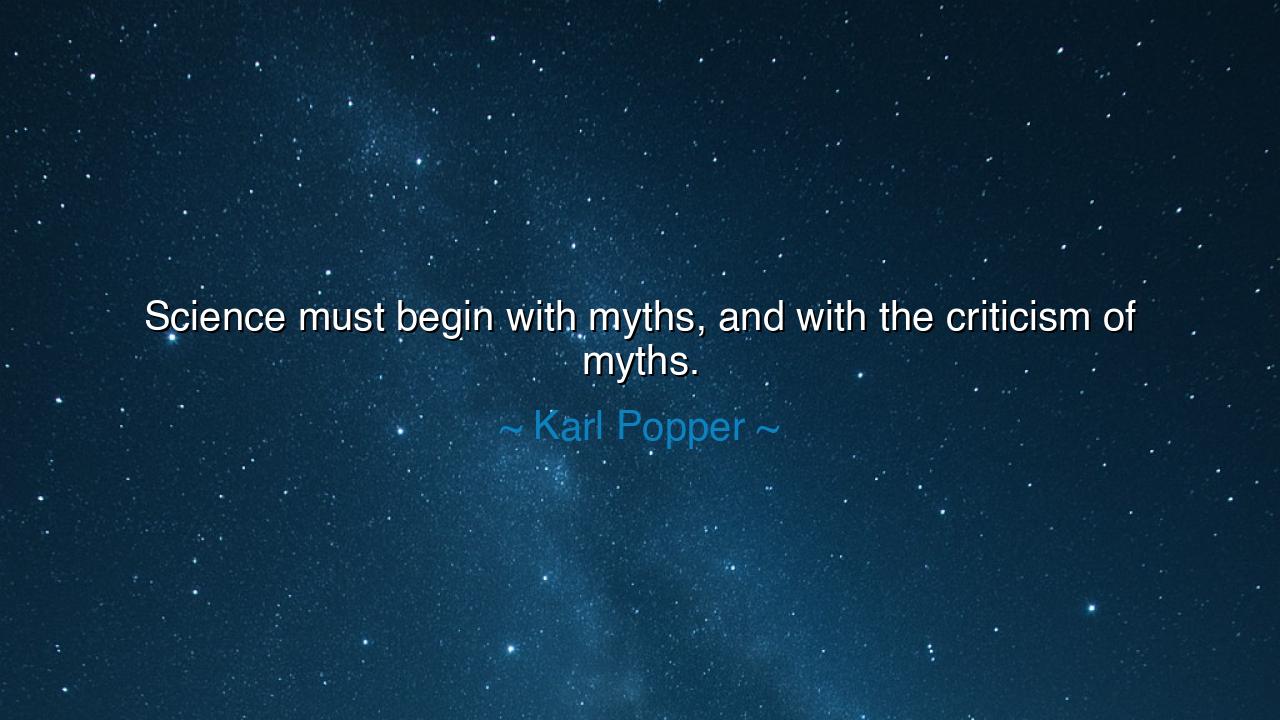
Science must begin with myths, and with the criticism of myths.






Listen well, O children of wisdom, for I bring forth the words of Karl Popper, a thinker whose reflections on science and myths challenge us to rethink the very foundation of human understanding. “Science must begin with myths, and with the criticism of myths.” In this profound statement, Popper reveals a truth that echoes through the annals of time—that science does not emerge from a blank slate, but from the stories and beliefs that shape the way we view the world. He teaches us that myths—those ancient narratives that explain the mysteries of existence—are not mere fictions, but the starting points for the journey toward knowledge. And in the pursuit of truth, we must not only seek to understand the world, but also to critique and challenge the myths that limit our understanding.
In the ancient world, the myths were the first attempts to explain the world and its forces. The Greeks told stories of Zeus, Poseidon, and Hera, gods who controlled the heavens and the earth. These myths, though rooted in imagination, were their way of grappling with the mysteries of the world. Plato, too, understood the role of myth in shaping human thought, famously presenting the Allegory of the Cave as a metaphor for the human condition. In this allegory, the prisoners in the cave are chained, only able to see the shadows of reality. They take these shadows as the truth, not knowing that a greater reality exists beyond the cave’s walls. Popper’s words resonate here: the myths of the ancient world, while not true in a literal sense, were the foundation upon which we built the quest for truth. And as we advance in our understanding, we must not only explore and embrace these myths, but also critique them, challenging their limitations and seeking to replace them with more accurate understandings of the world.
Popper’s assertion is not that science should be founded on falsehoods, but that myths serve a deeper purpose. They allow us to make sense of the unknown, to construct frameworks of meaning in a world that often seems beyond our comprehension. The myths of ancient cultures—the Egyptians, the Mesopotamians, the Indians—served as the early attempts to organize human experience and explain the forces of nature. However, as science progressed, these myths were eventually critiqued and replaced with empirical evidence. The story of Copernicus and Galileo, for example, shows how the myth of a geocentric universe, where the Earth was the center of creation, was overthrown by the scientific discovery of a heliocentric model. Science, as Popper suggests, begins with a myth, but through critical examination, it leads to the discovery of deeper truths.
Popper’s insight challenges us to see science not as an abstract, disconnected body of knowledge, but as a living, evolving force that grows out of the very stories and beliefs we hold dear. Take, for instance, the myth of alchemy, the ancient pursuit of turning base metals into gold. While alchemy was rooted in mystical thought, it gave rise to the science of chemistry. Through the criticism and refinement of these early ideas, alchemy evolved into the rigorous, empirical field of chemistry that has transformed our world. Popper reminds us that the very questions posed by these early myths—what is matter? what is transformation? what is life?—have led to the creation of modern science. And yet, like all myths, alchemy had to be challenged and ultimately replaced with a deeper understanding of the natural world.
The lesson here, O children, is that science is not an unbroken chain of progress, but a journey that begins in wonder and imagination. The myths of the past were the early attempts to understand the world, and science continues this quest by critiquing and evolving those myths. It is in the tension between myth and criticism that we find the true spirit of discovery. Just as the Greeks once sought to explain the world through their gods and heroes, so too must we continue to ask the deep questions that drive us toward truth. But we must also, as Popper urges, remain critical of the myths we inherit. For it is through criticism, through the willingness to challenge what we know, that we move closer to understanding the ultimate truths of our existence.
In your own lives, O children, understand that your pursuit of knowledge must be one of both respect and criticism. Science does not reject the myths that have shaped us, but it questions them, seeks to understand their limitations, and builds upon them to create deeper, more accurate understandings. As you journey through life, remember that your thoughts, your beliefs, and your understanding of the world are never final. There is always room for growth, always room for criticism and improvement. Embrace the myths that shape you, but never let them blind you to the deeper truths that are waiting to be uncovered.
So, O children, seek not to simply accept the myths handed to you, but to critique and understand them. In doing so, you will not only carry forward the legacy of science but also contribute to the never-ending quest for truth. Know that science and literature, myth and criticism, are all intertwined in the same sacred pursuit of knowledge. By honoring this unity, you will find that the mysteries of the universe are not something to fear, but something to embrace, question, and explore. Science is born of myth, and through the careful work of criticism, it will guide you to deeper wisdom and understanding.






AAdministratorAdministrator
Welcome, honored guests. Please leave a comment, we will respond soon